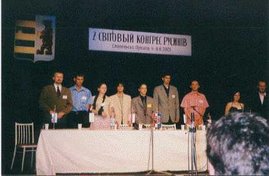 Outpost Dispatch #2, November 2003
Outpost Dispatch #2, November 2003According to eonline, the four Harry Potter books by J.K.Rowling have sold more than 110 million copies and have been translated into more than 40 languages, “including everything from Albanian to Zulu.” None of the books have been translated into any form of the Rusyn language, and they probably won’t be. However, that does not mean that there is no Rusyn connection to the Harry Potter phenomenon…
The speech of one of the characters in the English-language versions of the books, the giant Hagrid, is rather odd. He certainly speaks English, but with several idiosyncrasies. One Harry Potter fan site which includes information on Hagrid’s dialect sums up: “It's hard to pin it down to the use of individual words with any level of certainty.” The writer goes on to cite words and usages which seem to alternate between the Yorkshire and West County dialects of British English.
The peculiarities of Hagrid’s speech pose a special problem for translators seeking to retain the effect of the original.
In April 2002, A-Ba-Ba-Ha-La-Ma-Ha publishers started publishing the books in Ukrainian, translated by Viktor Morozov. The reader immediately notices that there is something odd about Hagrid’s speech. The character uses several grammatical forms and words which are clearly not literary Ukrainian, but just what they are isn’t quite as clear.
Ivan Malkovych, founder and president of A-Ba-Ba-Ha-La-Ma-Ha, told The Ukrainian Weekly that Morozov used a Halychyna (Galicia) dialect of Ukrainian to translate Hagrid’s odd speech into Ukrainian.
However, upon closer inspection, Hagrid’s speech is actually even closer to the spirit of the English-language versions than Malkovych’s comments indicate. He clearly is speaking Ukrainian, but with idiosyncrasies similar to the confusion between Yorkshire and West County English. In the Ukrainian translation, Hagrid is using a mash of literary Ukrainian, and Hutsul and Bojko (dialects claimed variously and at various times to be either Rusyn or Ukrainian), as well as Lemko and other more distinctly Rusyn dialects.
Based on the Ukrainian translation of Harry Potter and the Goblet of Fire (Harri Potter i Kelykh Vohnju), one major appearance of the Hutsul and Bojko dialects is Hagrid’s systematic use of the word sho (that), rather than the Ukrainian shcho. Another is the use of the word sy (self) over the Ukrainian sja, which is common to both Hutsul and Bojko, and is also an archaic feature of Lemko. All of Hagrid's third-person singular and plural (he/she/it and they) verb forms end in a hard “t,” which is also typical of both dialects (as well as Lemko and other dialects in the region).
However, Hagrid also uses the words nic (nothing) and jiden (one), which are both typical only of Bojko. At the same time, he uses mesh robyty (will do), which only occurs in Hutsul.
Adding to the confusion is Hagrid’s use of several words which are common to many dialects in the Carpathians – including other Rusyn dialects. Examples include his use of khtiv and khtila (wanted), various forms of the adjective fajnyj (fine, nice), trokha (a little bit), past tense forms like buv jem (I was) and znav jem (I knew), as well as mnov (instrumental case of “I”) and tobov (instrumental of “you”).
Even though Hagrid uses his distinctive Rusyn-tinged speech throughout the book, Rusyns are still waiting for a full Rusyn-language translation of Harry Potter. Hagrid’s speech in the Ukrainian versions is little more than a linguistic curiosity, rather insignificant in the grand scheme of things – not nearly enough to satisfy the discerning Rusyn reader.
.png) Of course, don’t hold your breath waiting for a Rusyn translation of any of the Harry Potter books. Even if a Rusyn publisher could afford to pay for the rights to the books, it is doubtful enough would sell to even come close to breaking even, let alone turning a profit…
Of course, don’t hold your breath waiting for a Rusyn translation of any of the Harry Potter books. Even if a Rusyn publisher could afford to pay for the rights to the books, it is doubtful enough would sell to even come close to breaking even, let alone turning a profit…But on the other hand, despite the horrid conditions in the publishing industry in Ukraine, the Harry Potter books have managed to become blockbusters even there. The publisher faced an uphill battle, because so few Ukrainians buy and read Ukrainian-language books, publishing costs in Ukraine are higher than in Russia, and the international market for Russian-language books allows higher print runs which in turn allows lower per-copy prices. The kiss of death, however, should have been the fact that the first Russian translations of the series hit Ukrainian shelves more than a year before the Ukrainian ones – which means that most Ukrainians had already read the books. Nevertheless, when Harry Potter and the Sorcerer’s Stone (Harri Potter i Filosofs’kyj Kamin’) debuted in Kiev on 13 April 2002, more than 1000 copies of the book were sold in just the first hour – while most Ukrainian-language books would be proud of selling as many books in a full year.
Perhaps a Rusyn translation isn’t such a bad idea after all…








No comments:
Post a Comment